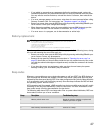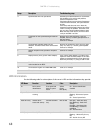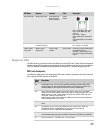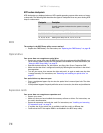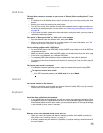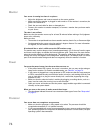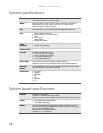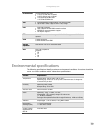
www.gateway.com
73
DIM code checkpoints
The Device Initialization Manager (DIM) gets control at various times during BIOS POST to initialize
different system buses. The following table describes the main checkpoints where the DIM module
is accessed.
EB Disable ATAPI hardware. Jump back to checkpoint E9.
EF Read error occurred on media. Jump back to checkpoint EB.
E9 or
EA
Determine information about root directory of recovery media.
F0 Search for pre-defined recovery file name in root directory.
F1 Recovery file not found.
F2 Start reading FAT table and analyze FAT to find the clusters occupied by the recovery
file.
F3 Start reading the recovery file cluster by cluster.
F5 Disable L1 cache.
FA Check the validity of the recovery file configuration to the current configuration of
the flash part.
FB Make flash write-enabled through chipset and OEM-specific method. Detect correct
flash part. Verify that the found flash part size equals the recovery file size.
F4 The recovery file size does not equal the found flash part size.
FC Erase the flash part.
FD Program the flash part.
FF The flash has been updated successfully. Make flash write-disabled. Disable ATAPI
hardware. Restore CPUID value back into register. Give control to F000 ROM at
F000:FFF0h.
Checkpoint Description
2A Initialize different buses and perform the following functions:
■
Reset, Detect, and Disable (function 0) — Disables all
device nodes, PCI devices, and PnP ISA cards. It also
assigns PCI bus numbers.
■
Static Device Initialization (function 1) — Initializes all
static devices that include manual configured onboard
peripherals, memory and I/O decode windows in PCI-PCI
bridges, and noncompliant PCI devices. Static resources
are also reserved.
■
Boot Output Device Initialization (function 2) — Searches
for and initializes any PnP, PCI, or AGP video devices.
38 Initialize different buses and perform the following functions:
■
Boot Input Device INitialization (function 3) — Searches for
and configures PCI input devices and detects if system has
standard keyboard controller.
■
IPL Device Initialization (function 4) — Searches for and
configures all PnP and PCI boot devices.
■
General Device Initialization (function 5) — Configures all
onboard peripherals that are set to an automatic
configuration and configures all remaining PnP and PCI
devices.
Check
point
Description





